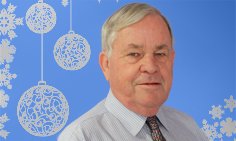LONG and tangled threads of history, culture and religion hang from the word “Christmas”. It is difficult to discern its meaning for today and therefore what the content of the MJA should be at this season.
We hazard three interpretations, which are reflected in the pages of the MJA. First, Christmas means holidays, so we hope you find the latest issue of the Journal relaxing holiday reading.
One should remember that the opportunity for idleness is ultimately a good thing. An essay in the The Economist titled “In praise of laziness” used observations from productivity studies to show that busyness is bad for creativity and lateral thinking. Chief among the reasons why people had too much busyness was not too many meetings, but too much email.
So, instead of email, we have several light-hearted MJA Christmas Competition entries to cheer you — with topics from syncope, alopecia and hobbits to the power of gold coins and delights from the milliner — in our Christmas Crackers section.
Second, although the religious significance of Christmas varies in Australian society, it traditionally remains a time to think generously about others, especially the marginalised and disadvantaged. Several articles in the MJA ask us to think carefully about their needs.
Self-determination in health is a key theme in a Perspectives article arguing for the role of Aboriginal community-controlled health organisations in enabling Indigenous people’s access to mainstream health care. A Reflections article ADD LINK describes an innovative workshop to encourage Indigenous high school students to pursue a career in health.
In the case of refugees, research shows that mental health problems were the most common reason for asylum seekers in detention to attend the emergency department in Darwin. A Perspectives article stresses that harm prevention strategies in this group need to consider the contribution that closed detention makes to their distressing problems.
An editorial by Gillian Triggs reminds us that, as recently as August 2013, the United Nations Human Rights Committee again found Australia in breach of its human rights obligations. As president of the Australian Human Rights Commission, she reiterates the Commission’s recommendation to increase the use of community detention and bridging visas as more sensible and humane choices than closed detention.
Third, Christmas helps us recall the value we place on family and friends. We share gifts and meals, and endure Christmas Day in the company of extended family for a good cause. In this way we connect, even if dimly, with our deepest values.
We in medicine are especially fortunate that, relating to people deeply so often, we are frequently reminded of these values — love, hope and generosity. The essence of family love is touchingly recounted in a Reflections article, and we can empathise with a father’s hope of a new treatment for a dying son. It is family love strengthened in a crisis that motivates a Reflections author to do hospital night shifts.
Meanwhile, the spirit and generosity of rural communities may be one reason behind the research finding that undertaking an extended rural placement during medical school was associated with accepting a rural internship as a graduate.
Robert Bellah, the acclaimed sociologist of religion at the University of California, Berkeley, died in July this year, aged 86. In the preface to Religion in human evolution: from the Paleolithic to the Axial Age, Bellah said that his book “asks what our deep past can tell us about the kind of life human beings have imagined was worth living. It is an effort to live again those moments that belong to us in the depths of our present, to draw living water from the well of the past”.
Perhaps Christmas can help us do that for ourselves.
The staff at the MJA join me in wishing you a happy Christmas. Laze a bit, reflect, share, enjoy, draw water from the deep wells of the past, and prepare for an active new year.
Professor Stephen Leeder is the editor-in-chief of the MJA and professor of public health and community medicine at the University of Sydney.
This article is reproduced from the MJA.

 more_vert
more_vert
Regarding the article on the role of Aboriginal Communoty -Controlled health organisations, the statistics for 2011 indicate that most health expense for Indigenous people was during hospital admissions, with Indigenous people using less of the Medicare and PBS dollar than mainstream patients.
Obviously, the high rate of hospital ED presentations and admissions indicate that current funding programmes are not meeting the needs of many Indigenous patients to see a GP or registered Nurse in a timely fashion to address preventive health care needs including immunisation nor to obtain basic prescriptions.
Neither ACCHOs nor Medicare Locals provide services to patients out of hours, nor even to the extent of what Medicare defines as normal GP consultation hours, rather they require the patient to meet the needs of ACCHOs and Medicare Locals by being sick only during public service hours, putting up one of the major barriers to health care-availability. ACCHOs should provide GPs to work in rural hospitals after-hours rosters.
Only primary care GPs, primary care Nurses ,allied health professionals including AHWs and Pharmacies are in a position to deliver the Medicare and PBS services which Indigenous people are currently lacking, to avoid preventable hospital admission , so funding should be increased directly to them .